farmB Digital Agriculture organized a Workshop titled “Digital Transformation – towards a Sustainable Agriculture” on Friday, October 27, 2023 in Larissa.
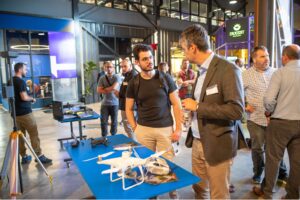
The day was organized in collaboration with the University of Turin, in the context of the SMAF-Smart Agriculture Farming program, a series of days-workshops, organized in various European countries, through EIT Food (European Institute of Innovation and Technology). They aim is to provide an overview of the challenges and opportunities associated with the deployment of data-driven technology solutions for smart agriculture.
The event was opened by Prof. Dr. Dionysis Bochtis Founder of farmB and Director of the Institute of Bio-economy and Agri-technology of CERTH followed by the Market Development Manager of farmB Mr. Ilias Platis – referring to the work and dynamics of farmB in the Agri-Food sector through the high technology it applies.
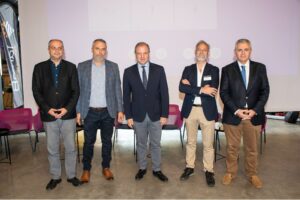
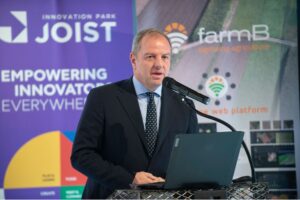
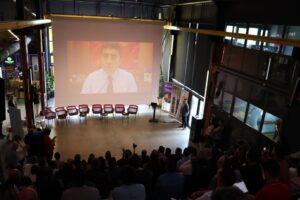
The Minister of Rural Development and Food, Mr. Lefteris Avgenakis, welcomed the event with a taped message stressing that professionals in the agricultural sector must embrace technological development and every innovative practice towards green development, highlighting the perspective of the primary sector in 4th Industrial Revolution. Greetings were also addressed by Mr. Maximos Harakopoulos – ND Member of Parliament and Mrs. Evangelia Liakouli – PASOK-KINAL secretary and Mr. Vassilis Kokkalis – SYRIZA PS Member of Parliament.
The first part of the conference, on Management, addressed the challenge of integrating the existing technological frameworks used in modern digital agriculture towards building unified interconnected ecosystems to fully utilize the collected data. The speeches were initialized by the Deputy Minister of Agricultural Development and Food, Mr. Dionysios Stamenitis, who congratulated farmB, for organizing the interesting day but also for its activity as a whole, as through the innovative digital platform it provides holistic solutions in the use of new technologies and of innovative practices in agriculture. The speeches continued with Mr. Athanasios Theodoropoulos – Head of Mon. of Education, Training and Agricultural Advice, Mr. Dimitrios Bardakidis – Quality & Risk Management ENA Development Consultants Mr. Dimitrios Dogoulis – President of GEO.TE.E Central Greece, Mr. Panagiotis Kalfoutzos – President of Agricultural Cooperative THESGI, Mr. Ioannis Pourikas – Head of Wheat Purchases and By-Products Sales of MELISSA KIKIZAS, Mr. Dimos Katsis – General Manager of AGROLAND A.E., and Mr. Dimitrios Sofologis – President of the Panhellenic Federation of Farmers’ Associations.
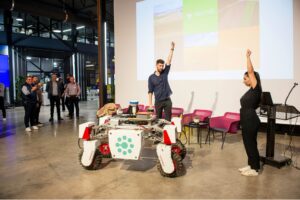
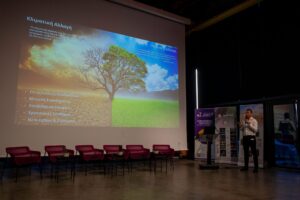
The second part of the Workshop, under subject of Sustainability, highlighted the importance of the Digital Transformation of agricultural supply chains and the benefits for the agri-food sector in terms of competitiveness, efficiency, quality, transparency, traceability and sustainability. The second round of speeches was opened by Mr. Vasilios Vassiliadis – Head of Regenerative Agriculture at SYNGETA, followed by Mr. Eleftherios Roumeliotis – Commercial Director of YARA HELLAS, Mr. Dimitrios Aidonis – President of the DIPAE Supply Chain Department, Mr. Dimitrios Drolias – Manager of Sustainable Development Solutions and Marketing of UPL, Mr. Georgios Zanakis – Marketing and Market Development Manager of CORTEVA and Ms. Sotiria Maroula – Manager of Cultivation and Products in Southern Europe, Middle East and Africa of COMPO EXPERT HELLAS.
The day highlighted the contribution of new technologies in strengthening the production and market of agri-food products. The event was attended by over 150 people from the state and the largest industries in the sector, including the Thessaly Deputy Regional Governor for the Primary Sector, Mr. Billis Apostolos and the Rector of the University of Thessaly, Prof. Billinis Charalambos, as well as Agricultural Consultants, Researchers, Farmers and Producers who had the opportunity to learn about the technological solutions developed and offered by farmB, which include the farmB digital crop management platform as well as state-of-the-art equipment such as robots, drones, weather stations and electronic traps to monitor the evolution of the insect population.

